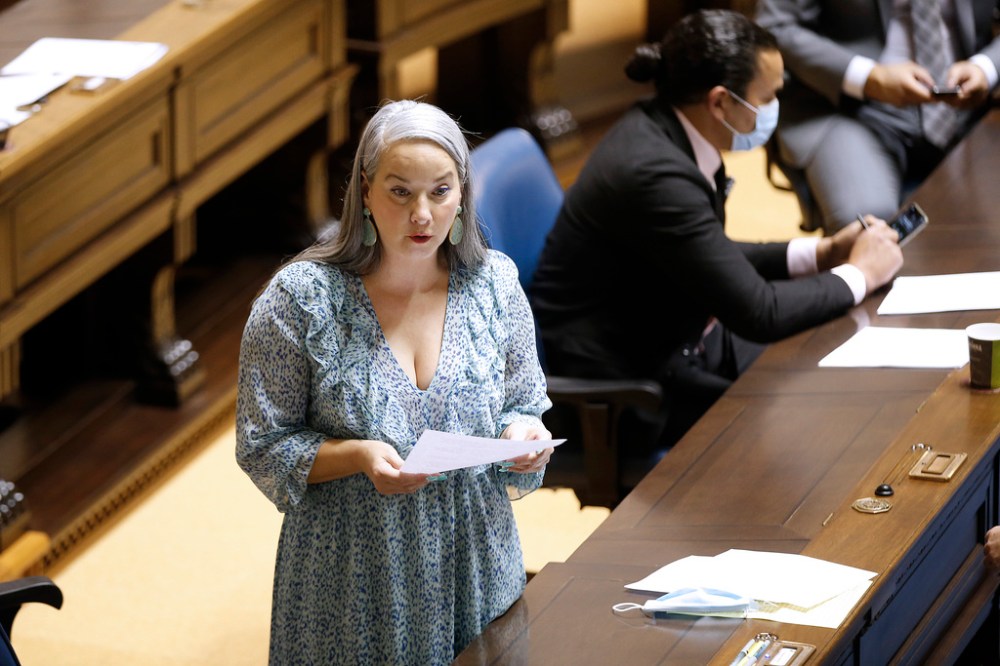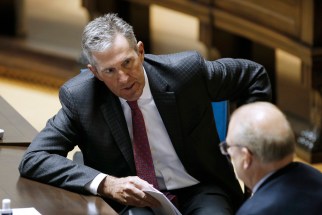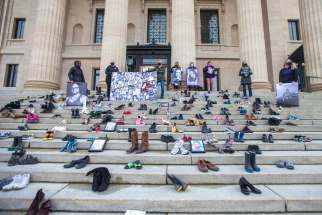Provincial government introduces 34 bills Agenda ignores economic, health fallout from COVID, opposition says
Read this article for free:
or
Already have an account? Log in here »
To continue reading, please subscribe:
Monthly Digital Subscription
$19 $0 for the first 4 weeks*
- Enjoy unlimited reading on winnipegfreepress.com
- Read the E-Edition, our digital replica newspaper
- Access News Break, our award-winning app
- Play interactive puzzles
*No charge for 4 weeks then billed as $19 every four weeks (new subscribers and qualified returning subscribers only). Cancel anytime.
Read unlimited articles for free today:
or
Already have an account? Log in here »
Hey there, time traveller!
This article was published 13/10/2020 (1488 days ago), so information in it may no longer be current.
The provincial government introduced 34 bills Wednesday in an agenda that critics say is ignoring the enormous health and economic crisis the province faces with COVID-19.
“We have a very robust legislative agenda,” Health Minister Cameron Friesen told reporters outside the chamber. Most were previously introduced but not allowed to pass when the pandemic abbreviated the spring session and regular sitting days didn’t resume until Oct. 7.
Friesen touted Bill 10 — the Regional Health Authorities Amendment Act that was introduced for the third time Wednesday — “really would express the architecture of the new health-care system… and new ways to create a better, stronger health-care system.”

He said he’s looking forward to seeing the bill passed during the current session along with the others that died on the order paper last time.
“For all of these bills, we think this is significant legislative agenda that we have and we’re here to see it through.”
Many of the bills should’ve been left behind or left for dead, the opposition said.
“A lot of them are, like, fixing horse racing and school board elections,” NDP Opposition Leader Wab Kinew told reporters.
“This, during a COVID pandemic, is on a day when we had the record-high case count,” he said Wednesday, when Manitoba reported 146 new positive tests. “It’s not exactly the top priorities of Manitobans right now, I would say.
“We’re still waiting for a bill to enable paid sick leave, we’re still waiting for more assistance for small business owners. Those are measures that I would have liked to see the government introduce in a very aggressive and timely fashion. Let’s make sure the things we need to get through this pandemic right now are the ones we’re dealing with at the earliest opportunity.”
Liberal Leader Dougald Lamont was similarly unimpressed.
“For us to be in a crisis of this magnitude and for them to say ‘steady as she goes,’ that’s really an indication of a lack of imagination and stubbornness of this government,” Lamont said. “There’s a huge number of things that are huge problems they’re either going to ignore or make worse.”
The resurrection of the Public Utilities Ratepayer Protection and Regulatory Reform Act is the most worrisome, said both Kinew and Lamont. Bill 35 introduces significant changes to the Public Utilities Board Act, the Manitoba Hydro Act, the Manitoba Public Insurance Corporation Act and the City of Winnipeg Charter. It would allow hydro rates to be set by cabinet decree rather than determined by the Public Utilities Board.
“They are promising to politically interfere with hydro by directing what the prices for rates are going to be — they’re trying to steamroll the PUB, which is supposed to protect Manitobans,” Lamont said. “They want to strip power away from the City of Winnipeg and have a process where developers will be able to appeal but citizens won’t. It’s just giveaways to their donors. It’s not good for the future of the province and it’s got nothing to do with the pandemic.”

Kinew said that he’s worried about hydro bills getting more expensive. Before the “ratepayer protection” act was introduced Wednesday, Finance Minister Scott Fielding on Friday introduced Bill 2 — the Budget Implementation and Tax Statutes Amendment Act — which included increasing consumer hydro and Centra gas rates by 2.9 per cent, effective Dec. 1, bypassing the normal regulatory process.
“That piece of legislation introduced today is going to set the stage for hydro rate increases for years to come,” Kinew said. “Rather than it being an impartial third party — the PUB — it’s going to be the cabinet that sets the rates.”
carol.sanders@freepress.mb.ca

Carol Sanders
Legislature reporter
After 20 years of reporting on the growing diversity of people calling Manitoba home, Carol moved to the legislature bureau in early 2020.
Our newsroom depends on a growing audience of readers to power our journalism. If you are not a paid reader, please consider becoming a subscriber.
Our newsroom depends on its audience of readers to power our journalism. Thank you for your support.








